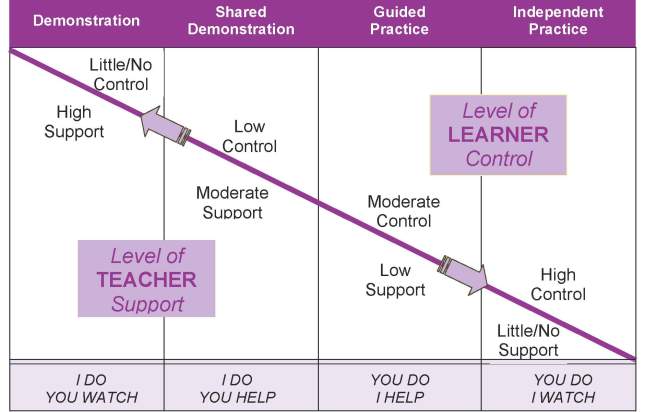Why is it so hard for me to learn some basic ideas?
Seriously. I’m pretty bright, generally speaking. Ask around. People will tell you I have many faults (and I’ll agree with most of them!). However, a lack of intellectual firepower and/or curiosity is not generally one of them.
And yet, I still can’t seem to remember one simple thing: L likes to do it herself!
Very early on, my handsome husband was attempting to transport L from one place to another. She replied in indignation, “No mommy carry you! No daddy carry you! L do. A-self!”
She likes to be independent.
I have previously written about how difficult it is to divorce myself from the processes and norms of school. As a former teacher and teacher educator, it is particularly hard for me to let go of the idea of gradual release of responsibility.

The basic idea behind gradual release of responsibility is that the teacher is the mentor in the classroom. As the resident expert in a given content area, it is the responsibility of the teacher to support the learner in their apprenticeship in that area. As a part of the apprenticeship, the mentor begins with heavy support and eventually, the balance shifts to the apprentice having the majority of the responsibility.
Another way to think about this model is that first, the teacher models the content. Then, the apprentice tries the content while the mentor giving hands-on with assistance. Finally, the apprentice is able to demonstrate mastery over the content.
This is such a great model. I believe in it strongly, particularly in my experience teaching middle grades in a workshop format. The only big problem? L hates it.
We get a monthly delivery of Tinkercrate. It’s a great hands-on, exploratory, all-in-one service. After looking closely at the different levels and formats the service offers, L decided she wanted the Tinker version, which is building and experimenting with projects. It’s advertised for children ages 9-16+. L’s hands aren’t particularly strong, so I suspected she would need support with some of the physical work.
Our delivery last month was the automaton.
L grabbed the crate out of the mail as soon as it arrived. We sat down and looked at the project, reading the first few pages of the guide. I told her there was a video on youtube, but she wasn’t interested in looking at the video. Instead, we pulled out the materials and got started.
By “and got started,” I mean that I asked her thoughtful questions and offered help as I thought she might need it. She replied with feigned helplessness.
She didn’t know how to pick something up. Or how to peel the backing off a sticker. She looked at me – no, through me – when I asked her questions. I felt my frustration growing, but knew that she needed me to help her, as I am the mentor and she is the apprentice.
I persisted with my helping. I am very persistent.
She persisted with being floppy and without ideas. She is very persistent.
An hour passed.

As far as she got with an hour of my help
I finally got so frustrated that I walked away. I told her, “L. I know that you know how to ask for help if you want it. I will be in the other room, reading my book and drinking coffee.” I then went in the other room, feeling quite smug. Ha! I showed her! She needs my help and soon she’ll come and ask me for it. Then, I will help her and things can proceed.
I was about 15 pages into my book when I happened to glance back into the kitchen.
She had completed about three-quarters of the project now that I had simply left her alone. I decided to walk over and refill my coffee, snapping the picture below.

As far as she got after 15 minutes of me leaving her alone
My own ego gets in the way of homeschooling (heck – of parenting!) on a pretty regular basis. I’m going to continue applying my intellect to the idea that I need to trust my child. If something is too hard, she’ll let me know. If she wants help (not needs it, but wants it), she’ll let me know. My expectations and routines are just that – my expectations and routines. It is my work to provide her with an environment that supports her inquiry and curiosity. Beyond that, it is my work to get out of the way.
If you need me, I’ll be in the other room, drinking coffee and reading my book.


Yep! And we do it ALL the time, don’t we? -Elizabeth
LikeLike
Thank goodness we know so much, huh?! 🙂
LikeLike